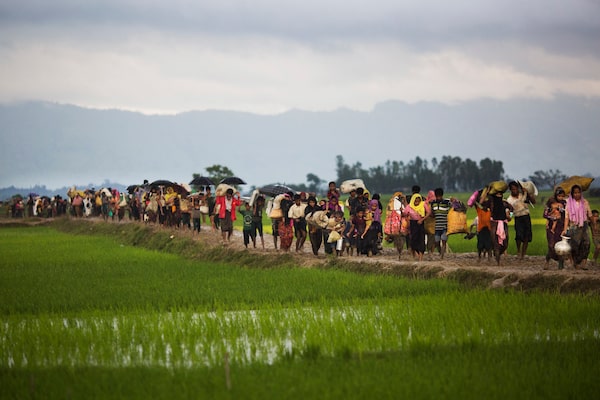
In this Sept. 1, 2017, file photo, members of Myanmar's Rohingya ethnic minority walk past rice fields after crossing the border into Bangladesh.Bernat Armangue/The Associated Press
John Packer is a former United Nations staffer who is currently an associate professor of law and the director of the Human Rights Research and Education Centre at the University of Ottawa.
Last week, governments and non-governmental organizations co-operated to transfer two Myanmar soldiers, who had admitted to participating in the commission of acts of genocide against the Rohingya, to The Hague, where they will presumably testify at a trial before the International Criminal Court (ICC).
These admissions are noteworthy in that they were made by perpetrators who alleged they were ordered to commit these acts. They will be important for corroborating and linking specific events, commands and detailed conduct with the evidence that exists from victims and independent observers, including satellite photography. The specificity and consistency of the soldiers' testimonies will be crucial in convincing any court – and the world – about the atrocities being carried out in Myanmar.
But while this news quickly captured attention and headlines, the information per se is not new or even surprising – indeed, it may not be so helpful for efforts to materially help the Rohingya.
Abundant evidence has long been available that is consistent with well-known tactics of the Tatmadaw (as the country’s armed forces are known). In fact, even this latest development is not really new: The same two soldiers recorded their admissions after deserting and being captured in July by the Arakan Army, a non-Rohingya insurgent group in Rakhine State fighting against the Tatmadaw.
There are a number of international efforts to seek justice for the Rohingya and accountability for perpetrators – both individuals and the State of Myanmar. However, the basis for jurisdiction and the prospects of ICC trials are unclear. In principle, the ICC has no jurisdiction, since Myanmar is not a party to the Rome Statute establishing the court, and the UN Security Council has not moved to refer the situation to the ICC and is unlikely to do so.
Moreover, the authority granted to the prosecutor does not cover the crime of “genocide” and is unlikely to do so. The ICC cannot prosecute states or governments, either, just individuals. Myanmar, which has consistently dismissed allegations out of hand, would surely point out that individual soldiers neither plan nor command their actions but sometimes act alone or even contrary to orders, as Myanmar has asserted in some cases it has brought to trial (at standards below international ones for due process).
In the ICC structure, the testimonies and even convictions won’t amount to much on their own. They are unlikely to change positions or policies in Myanmar, much less provide reparation for the victims. And if they’re convicted, the soldiers will almost certainly serve out their sentences in better conditions than those of two-thirds of the world’s Rohingya, who are living in squalid refugee camps, struggling to survive unwanted and unprotected elsewhere or still facing an unknown fate in Myanmar. It is doubtful such “justice” will satisfy the Rohingya or many advocating for them, nor is it likely to trouble Myanmar.
But the soldiers' testimonies may have greater effect in another forum, located across town from the ICC in The Hague. At the International Court of Justice (ICJ), Gambia has displayed some temerity in contesting Myanmar for violations of the Genocide Convention. Myanmar cannot escape this action and faces serious consequences and potentially substantial reparations should the court deliver judgment against it. Indeed, merely on the basis of the ICJ’s order in January of provisional measures imposed on Myanmar, Germany suspended its development co-operation with Myanmar until the Rohingya are repatriated.
Other countries have announced their support for Gambia’s action, perhaps most notably the 57 member states of the Organisation of Islamic Cooperation; the Maldives, Canada and the Netherlands also recently announced their intentions to intervene in the case to support Gambia. It bears observing that the transfer of the two soldiers to The Hague required the active co-operation of governments that obviously have a keen interest and, for some, stakes in the matter.
In contrast to the ICC’s doubtful jurisdiction and the efforts to discredit it, Myanmar pays the ICJ full attention and respect. Remarkably, Myanmar’s State Counsellor Aung San Suu Kyi travelled to The Hague to “defend the national interest at the ICJ” on behalf of the people and the national army.
While official denial persists and acts of erasure now proceed under the banner of “development” projects in the Rohingya homeland, decisions at the ICJ could roll these back and place a cloud of uncertainty over such projects as the fruits of illegitimate gains.
And so the two soldiers are important in a way that far exceeds their status or personal conduct, because their testimonies could substantially bolster the case against Myanmar itself at the ICJ level. Myanmar government officials in Nay Pyi Taw must at least be discomforted. Meanwhile, for the Rohingya, it’s one more step in their decades-long search for justice and, hopefully, restitution.
Keep your Opinions sharp and informed. Get the Opinion newsletter. Sign up today.